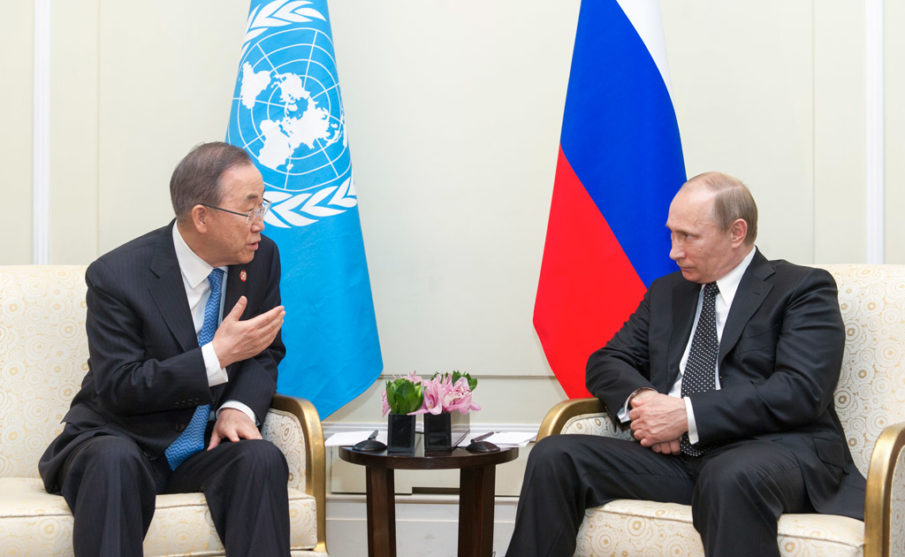Two days after the United Nations Security Council unanimously voted to approve new, stricter sanctions on North Korea following their sixth, and largest nuclear test to date, North Korea vowed to redouble its efforts to counter what Kim’s regime refers to as the “threat of U.S. invasion.”
The possibility for conflict on the Korean peninsula is quickly shaping up to be a tent-pole in the Trump administration’s foreign policy, whether by intentional design or not. President Trump received some stark criticism for his decision to adopt a new, more aggressive tone in public statements directed at North Korea, but many believed the tactic worked, as Kim Jong un soon announced that he’d be shelving plans for a ballistic missile test that would have targeted the region around American territory in Guam.
North Korea’s recent test of a much more powerful nuclear weapon design, believed to be a two-stage thermonuclear (or hydrogen) bomb, however, prompted a new heightening of tensions between the two nations. Following the Security Council vote on new sanctions targeting North Korean textile exports and fuel imports primarily, President Trump told the media that these new restrictions were only a “small step” toward what would need to be done in order to reign in Kim’s nuclear ambitions, going on to say that he wasn’t sure “if it has any impact.”
North Korea countered these sentiments by claiming the UN was working to infringe on the nation’s ability to defend itself, by “completely suffocating its state and people through full-scale economic blockade.”
The DPRK will redouble the efforts to increase its strength to safeguard the country’s sovereignty and right to existence and to preserve peace and security of the region by establishing the practical equilibrium with the U.S.” it said in a statement carried by the official KCNA news agency.
These statements were in the same vein as those made by North Korea’s ambassador to the United Nations, Han Tae Song, immediately following the unanimous decision, saying, “The forthcoming measures … will make the U.S. suffer the greatest pain it ever experienced in its history.”
Primary among the concerns about how effective the new slew of UN sanctions can truly be in terms of convincing Kim Jong un to give up his nuclear and ballistic missile development programs, are the ways North Korea has continued to conduct business with Pacific powers China and Russia, both of whom have seen a trade increase with North Korea since tensions have begun to rise.
It is essential that the international community work together to increase economic pressure on North Korea,” Marshall Billingslea, assistant secretary in the Treasury Department’s Office of Terrorism and Financial Intelligence, said in a meeting of lawmakers regarding North Korea. “DPRK bank representatives operate in Russia in flagrant disregard of the very resolutions adopted by Russia at the UN,” he said in prepared remarks.
“We don’t threaten China, even a little bit, with country sanctions because that would be difficult, politically,” said Rep. Brad Sherman, a California Democrat. Many have been critical of China’s continued foot-dragging regarding efforts to economically isolate North Korea. China is North Korea’s primary economic and diplomatic ally, accounting for 90% of all of the North’s import and export trade.
Billingslea went on to respond that the United States is “capable of tracking North Korea’s trade on banned goods… and we will act even if China does not.”
North Korea is believed to be disguising the origins of export ships destined for Chinese ports to allow entry, as well as using more complex systems within China and Russia to funnel funding into Kim’s government. The U.S. Treasury has already levied sanctions on a number of businesses and individuals within China and Russia for doing just that, but there has yet to be any formal complaints levied directly at the Chinese or Russian governments for the involvement of entities within their nations for financing Kim’s nuclear pursuits.
Already have an account? Sign In
Two ways to continue to read this article.
Subscribe
$1.99
every 4 weeks
- Unlimited access to all articles
- Support independent journalism
- Ad-free reading experience
Subscribe Now
Recurring Monthly. Cancel Anytime.


COMMENTS